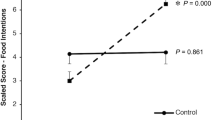Abstract
Schools are recognized as venues for population-based health promotion and chronic disease prevention initiatives targeting children, and the school food environment is a central component. The Healthy, Hunger-Free Kids Act of 2010 utilized research-based findings and expert recommendations to significantly improve school lunch standards in the kindergarten to twelfth grade (K-12) setting to enhance the nutritional intake and ultimately the health of children. The new guidelines include increasing the availability of whole grains, fruits, and vegetables; requiring children to select a fruit or vegetable daily; and restricting serving sizes. There is currently no evidence that the revised standards have increased school lunch plate waste. However, there is evidence that children are consuming more healthful foods. The Society of Behavioral Medicine (SBM) supports retaining current school lunch standards set by the Healthy, Hunger-Free Kids Act of 2010. SBM also supports increasing the evidence-based by evaluating the implementation and impact of the school lunch revisions.
Similar content being viewed by others
References
United States Department of Agriculture, Food and Nutrition Service. Fact sheet: National School Lunch Program. Available at www.fns.usda.gov/sites/default/files/NSLPFactSheet.pdf; 2013; Last accessed January 9, 2015.
Coleman-Jensen A, Gregory C, Singh A. Household food security in the United States in 2013. http://www.ers.usda.gov/publications/err-economic-research-report/err173.aspx; 2014; Last accessed February 4, 2015.
United States Department of Agriculture. The Healthy, Hunger-Free Kids Act of 2010. Available at www.fns.usda.gov/cnd/Governance/Legislation/CNR_2010.htm; 2013; Last accessed January 9, 2015.
United States Department of Agriculture and United States Department of Health and Human Services. Dietary Guidelines for Americans 2010. 2010th ed. Washington, DC: US Government Printing Office; 2010.
IOM (Institute of Medicine). School Meals: Building Blocks for Healthy Children. Washington, DC: The National Academies Press; 2010.
Nutrition standards in the national school lunch and school breakfast programs: final rule. US Department of Agriculture. http://www.gpo.gov/fdsys/pkg/FR-2012-01-26/html/2012-1010.htm. Published January 26, 2012. 77 Federal Registrar 17. 111th US Congress. Healthy Hunger-Free Kids Act 2010, Public Law 111–296. Accessed January 9, 2015.
Cohen JFW, Richardson S, Parker E, et al. Impact of the new US Department of Agriculture school meal standards on food selection, consumption, and waste. Am J Prev Med. 2014; 46: 388-394.
Confessore N. How school lunch became the latest political battleground. New York Times: http://www.nytimes.com/2014/10/12/magazine/how-school-lunch-became-the-latest-political-battleground.html?_r=0; 2014; Last accessed February 4, 2015.
Gordon AR, Crepinsek MK, Briefel RR, Clark MA, Fox MK. The third School Nutrition Dietary Assessment Study: summary and implications. J Am Diet Assoc. 2009; 109(suppl 2): S129-S135.
Johner NM. Evaluation’s vital role in healthier school meals. J Am Diet Assoc. 2009; 109(suppl 2): S18-S19.
Story M, Nanney MS, Schwartz MB. Schools and obesity prevention: creating school environments and policies to promote healthy eating and physical activity. Milbank Q. 2009; 87(1): 71-100.
Daniels D. Examining attendance, academic performance, and behavior in obese adolescents. J Sch Nurs. 2008; 24: 379-387.
Forestell CA, Mennella JA. Early determinants of fruit and vegetable acceptance. Pediatrics. 2009; 120: 1247-1254.
Wansink B, Just DR, Payne CR, Klinger MZ. Attractive names sustain increase vegetable intake in schools. Prev Med. 2012; 55: 330-332.
Hanks AS, Just DR, Wansink B. Smarter lunchrooms can address new school lunchroom guidelines and childhood obesity. J Pediatr. 2013; 162: 867-869.
Schwartz MB, Henderson KE, Read M, Danna N, Ickovics JR. New school meal regulations increase fruit consumption and do not increase total plate waste. Child Obes. 2015. doi:10.1089/chi.2015.0019.
Woo Baidal JA. Protecting progress against childhood obesity—the National School Lunch Program. N Engl J Med. 2014; 371: 1862-1865.
Acknowledgments
This manuscript was supported by the National Cancer Institute under award number R25CA057699. JB was supported by the National Cancer Institute. The content is solely the responsibility of the authors and does not necessarily represent the official views of the National Institutes of Health. The authors wish to gratefully acknowledge the expert review provided by the Society of Behavioral Medicine’s Health Policy Committee, Health Policy Council, and the Obesity and Eating Disorders Special Interest Group.
Compliance with ethical standards
All procedures were conducted in accordance with ethical standards.
Conflict of interest
The authors declare that they have no competing interests.
Author information
Authors and Affiliations
Corresponding author
Additional information
Implications
Practice: Schools should provide lunches to children in compliance with the Healthy, Hunger-Free Kids Act of 2010 and should incorporate nutrition education, promote consumption of more healthful foods, and create cafeteria environments that facilitate healthful eating.
Policy: SBM recommends retaining current school lunch standards and opposes weakening these standards given the potential impact on the population-level health of American children.
Research: Further research will require evaluating the implementation and longer-term impact of the 2010 school lunch revisions.
About this article
Cite this article
Buscemi, J., Odoms-Young, A., Yaroch, A.L. et al. Society of Behavioral Medicine (SBM) position statement: SBM supports retaining healthy school lunch policies. Behav. Med. Pract. Policy Res. 5, 357–359 (2015). https://doi.org/10.1007/s13142-015-0318-z
Published:
Issue Date:
DOI: https://doi.org/10.1007/s13142-015-0318-z



